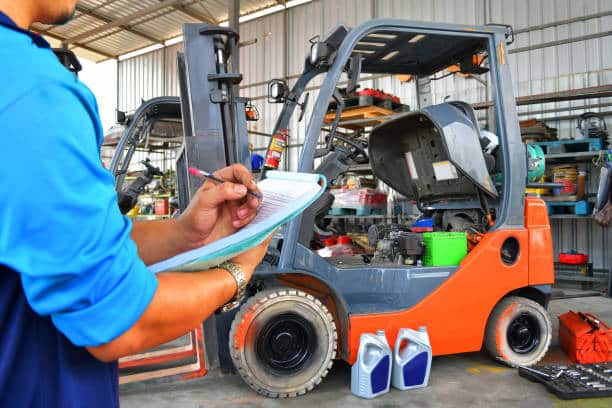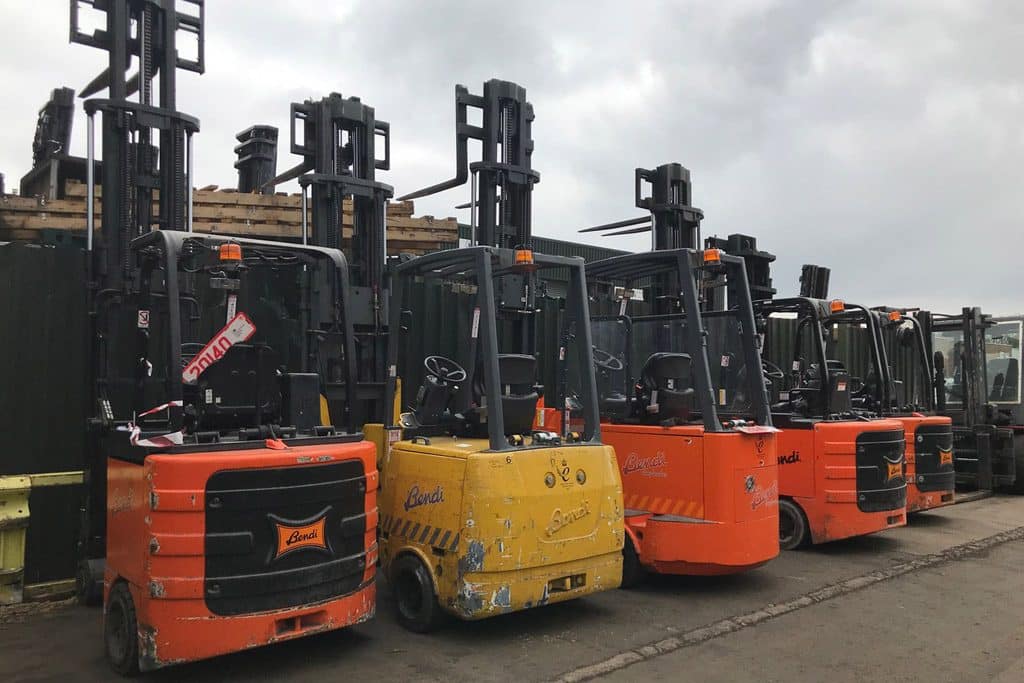In the bustling world of logistics and warehousing, forklifts are indispensable. These workhorses of the material handling industry perform a myriad of tasks daily, from moving heavy pallets to stacking goods in towering racks. But, like any piece of machinery, forklifts need regular servicing to maintain optimal performance and prevent costly downtime. Let’s delve into the long-term return on investment (ROI) of ensuring your forklifts are regularly serviced.
What are the common costs associated with forklift servicing?
Understanding the typical expenses tied to forklift servicing is essential for effective budget management and long-term operational efficiency.
-
- Inspecting for fluid leaks: Regular inspection can help identify any leaks in the engine oil, hydraulic fluid, coolant, or fuel systems. Fluid leaks, if left unchecked, can lead to significant mechanical failures and costly repairs.
- Changing engine oil: Timely oil changes are crucial for maintaining engine efficiency and longevity. Fresh oil ensures proper lubrication, reducing friction and heat that can damage engine components over time.
- Checking fuel systems: Regular checks of the fuel system, including the fuel lines, filters, and injectors, help prevent clogs and ensure the forklift operates smoothly. Clean fuel systems enhance performance and reduce downtime.
- Maintaining cooling systems: The cooling system prevents the engine from overheating. Routine maintenance includes checking coolant levels, radiator conditions, and ensuring there are no leaks. This is essential to avoid engine overheating and subsequent damage.
- Inspecting batteries: For electric forklifts, battery health is paramount. Regular inspections help detect any issues with battery charge levels, connections, and electrolyte levels, ensuring optimal performance and longevity of the battery.
- Checking tires, axles, steering, and brakes: Ensuring these components are in good condition is vital for the safety and stability of the forklift. Properly inflated and undamaged tires, well-maintained steering and axles, and fully operational brakes contribute to a safe working environment.
How does regular servicing impact forklift lifespan?
Regular servicing can significantly extend the lifespan of a forklift. This regular attention helps to identify and address minor issues before they escalate into major problems, ensuring your forklift remains reliable and safe to operate. By scheduling consistent maintenance checks, you not only prolong the service life of your machinery but also enhance its efficiency and productivity.
Thorough maintenance records are essential in this process. Keeping detailed logs of each service allows you to track usage patterns and predict when different parts may require attention. This proactive approach can prevent sudden breakdowns that not only disrupt operations but also lead to costly repairs. Additionally, forklifts with higher hours on the clock necessitate more frequent maintenance, underscoring the importance of a tailored servicing schedule based on usage intensity.
Furthermore, regular cleaning is a simple yet crucial aspect of forklift maintenance. Weekly cleaning can prevent premature wear and electrical issues, which are common culprits in mechanical failures. A clean forklift operates more smoothly and has fewer unexpected failures, contributing to its longevity.
Investing in professional forklift maintenance services can also pay dividends. These experts bring specialised knowledge and promote thorough, quality servicing. Building a good working relationship with your technicians ensures a consistent standard of care for your forklifts, fostering a proactive maintenance culture within your operation.
Overall, regular servicing is an investment that yields long-term returns by extending your forklift’s operational life, minimising downtime, and reducing repair costs. For any business reliant on forklifts, such strategic maintenance is not just beneficial but essential.
What are the safety benefits of regular forklift maintenance?
Addressing the safety benefits of regular forklift maintenance is crucial for ensuring a secure and efficient working environment.
- Reduced Risk of Accidents: Regular servicing ensures that all forklift components are functioning correctly, reducing the likelihood of mechanical failure during operation.
- Compliance with Safety Standards: Adhering to a maintenance schedule helps meet regulatory standards, ensuring your forklift fleet remains compliant with OSHA safety practices.
- Improved Visibility and Operation: Maintenance checks often include ensuring lights, mirrors, and warning systems are in proper working order, which improves overall operational safety.
- Detection of Wear and Tear: Regular inspections help identify worn-out parts before they fail, preventing potential safety hazards.
- Personal Protective Equipment (PPE) Usage: Encourages the consistent use of PPE by maintenance staff, reinforcing a culture of safety in the workplace.
How do serviced forklifts perform compared to non-serviced ones?
Serviced forklifts consistently outperform their non-serviced counterparts in several key areas. First and foremost, regularly serviced forklifts are far less likely to experience unexpected breakdowns. This reliability stems from routine inspections and timely replacements of worn-out parts, ensuring that each component functions optimally.
Moreover, maintained forklifts demonstrate enhanced efficiency. For example, well-lubricated gears and clean filters allow internal components to operate smoothly, reducing the wear and tear that can decrease performance over time. This means that a serviced forklift can carry out tasks more swiftly and with greater precision than one that hasn’t been maintained.
An often-overlooked benefit is fuel efficiency. For internal combustion (IC) forklifts, a well-maintained engine consumes less fuel, translating into cost savings. Electric forklifts also benefit, as serviced batteries offer longer usage periods between charges, maximising operational hours.
Additionally, regular maintenance can significantly contribute to a safer working environment. Serviced forklifts are less likely to suffer from operational faults that could lead to accidents, such as steering issues or faulty brakes. This leads to fewer workplace injuries and less downtime due to repairs, enhancing overall productivity.
Lastly, many businesses find that well-maintained forklifts have a higher resale value. A documented history of consistent servicing can be a strong selling point should you decide to upgrade your fleet. Potential buyers will appreciate the reduced risk of future repair costs, allowing you to command a higher price.
What are the potential financial savings from reduced downtime?
Regular forklift servicing can significantly reduce downtime, which directly translates to financial savings. When forklifts are well-maintained, they are less likely to experience unexpected breakdowns. This means that operations can continue smoothly without the costly interruptions that come from equipment failure.
Reduced downtime also means that employees can maintain their productivity levels. When forklifts are out of service, workers may be left idle or forced to use less efficient methods to move materials. This inefficiency can lead to increased labour costs and decreased output, both of which negatively impact the bottom line.
Another financial benefit of reduced downtime is the avoidance of emergency repair costs. Emergency repairs are often more expensive than regular maintenance because they may require expedited shipping of parts or after-hours labour. By keeping forklifts in good working order through regular servicing, businesses can avoid these unexpected and often inflated expenses.
Minimising downtime through regular forklift servicing also helps to extend the lifespan of the equipment. When forklifts are properly maintained, they are less likely to suffer from severe wear and tear, which can lead to costly replacements. Extending the life of the equipment delays the need for capital expenditure on new forklifts, thereby preserving financial resources.
Furthermore, regular servicing can help in identifying and addressing minor issues before they escalate into major problems. This proactive approach not only reduces the likelihood of significant downtime but also ensures that repair costs remain manageable. Early detection and resolution of issues can prevent small problems from becoming expensive repairs, thus contributing to overall cost savings.
Conclusion
Regular forklift servicing is not just an operational task, but a smart investment with considerable long-term ROI. From reducing costly repairs and downtime to enhancing safety and extending the lifespan of your equipment, the benefits are numerous and impactful. By committing to a consistent maintenance schedule, you not only ensure the optimal performance of your forklifts but also contribute to a safer and more efficient workplace. Remember, proactive maintenance today can prevent costly disruptions tomorrow, allowing your business to thrive without unexpected setbacks.






